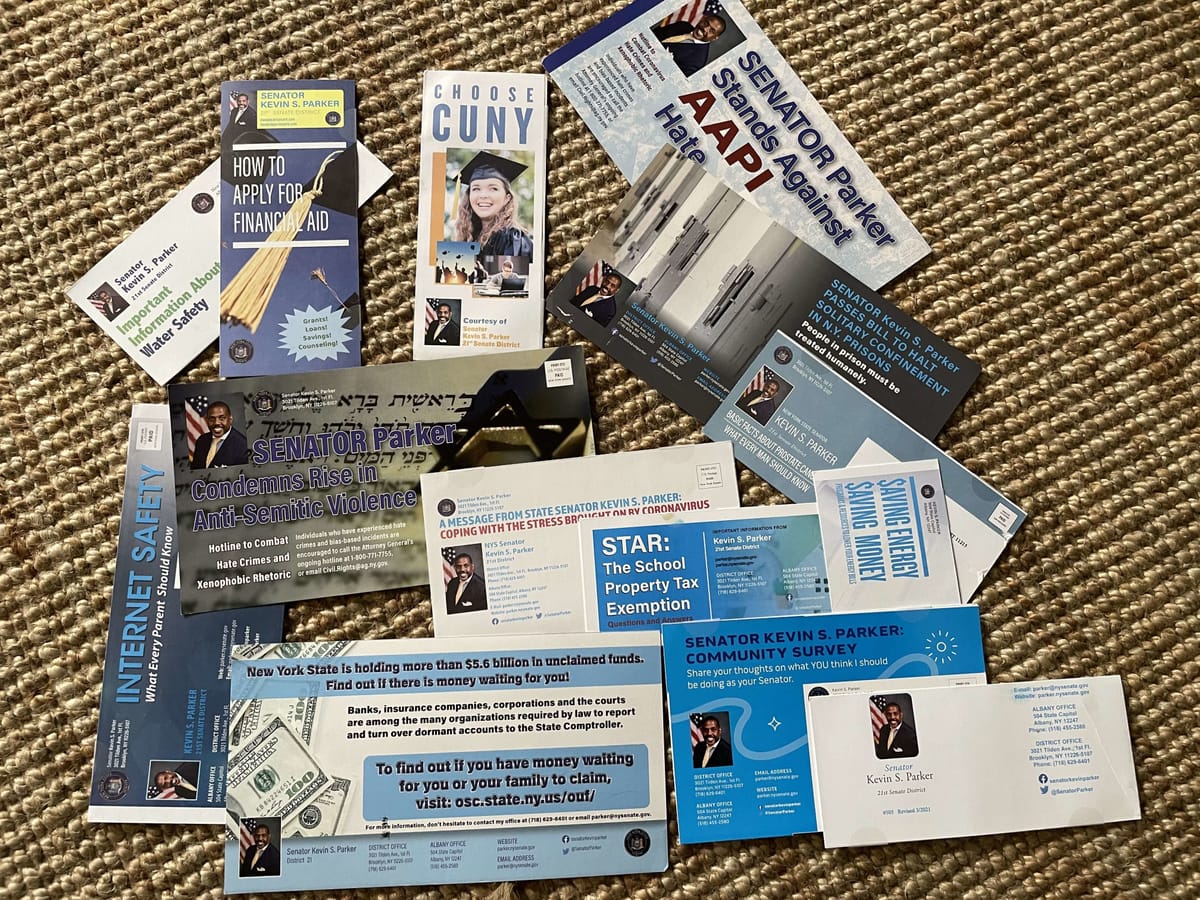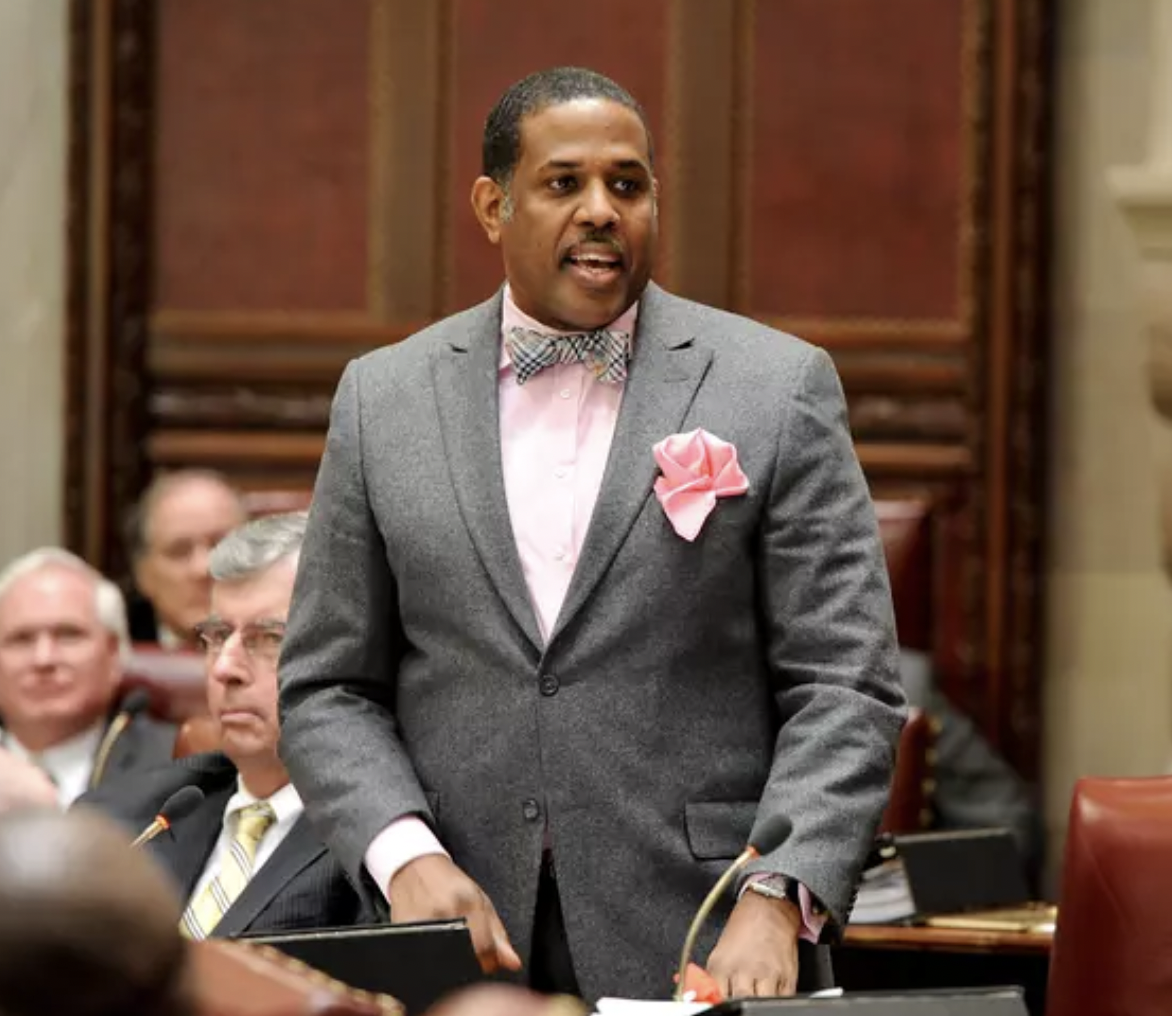Senator Kevin Parker Floods Some Constituents with Mailers Before Election Deadline


Internet safety. NYPD entrance exams. Lupus Awareness Month. Anti-Asian hate crimes.
Those are just four topics from a deluge of mass mailers from Brooklyn State Senator Kevin Parker that some constituents say have flooded their mailboxes in recent weeks.
“I’ve probably gotten more mail from him in the past month than I have in the previous decade,” Park Slope resident Joel Berg, who estimates he’s received around 20 mailers in the past month, told Bklyner.
“It’s bananas,” said Leah Archibald, another Park Slope resident, who said she’s been receiving an average of two mailers per week. “This literally can not be ok.”
The bombardment of taxpayer-funded mailers just so happens to come in advance of a June 22nd primary in which Parker is mounting a run for city comptroller. And it highlights a disparity between city and state law that gives Parker a small but notable advantage over his opponents who currently work at the city level.

New York City’s Charter prohibits the city’s “public servants” from using government funds for mailers within 90 days of a primary or general election, with some exceptions for emergency situations and the passage of the state budget.
That means that Parker’s top competitors, including Council Speaker Corey Johnson and Council Member Brad Lander, have been banned from sending government-funded mailers since mid-March.
But the Charter-enforced blackout only applies to “officials, officers and employees of the city,” leaving state legislators unaffected.
Instead, Parker, who was first elected to the Senate in 2002, is covered by internal Senate guidelines that limit the blackout period to just 30 days before the primary and general elections. So until May 21st, Parker is free to use his office’s mailer budget as he sees fit—with the added bonus that doing so might help build name recognition before the competitive election.
It’s an issue that has come up in other recent electoral battles between city and state politicians, and good government groups say it’s problematic.
“That’s obviously a loophole that needs to be changed,” said Rachael Fauss, Senior Research Analyst at the good government group Reinvent Albany. “It’s not like it’s uncommon to get mail in general from legislators. But the timing, of course, is the issue at hand.”
One week’s worth of mailers from NYS Senator Parker. We’re gonna need 2x week recycling if this keeps up. pic.twitter.com/oBiq6psqvl
— Leah Archibald (@leaharchibald) April 15, 2021
Each State Senator gets an annual allotment that includes enough mail for two district-wide newsletters, 123,077 pieces of bulk mail and another $10,800 for first-class mail, according to guidelines reviewed by the Rochester Democrat & Chronicle. Committee Chairs (of which Parker is one) get an extra 280,000 pieces for bulk mail to work with, Senate sources told Bklyner, up from about 158,000 in earlier years.
The Secretary of the State Senate, which processes and monitors member mailers, gives Senators a wide berth in how they use their allotment, which can be targeted by zip code or other factors, sources said.
The Senator’s office did not respond to multiple requests for comment, and it’s not clear if or how the recent mailers have been targeted. The four constituents inundated with mailers identified by Bklyner all live in portions of Parker’s district that overlap with Lander’s City Council district, while an East Flatbush constituent told Bklyner he had not noticed a similar increase.
And Parker’s office is free to use his entire allotment in the first half of the year, sources said, even if that leaves him with no mailers left to communicate with constituents in the second half of 2021.
.@SenatorParker @NYJCOPE This is just some of the taxpayer- funded mail my household received from Kevin Parker in last ten days (at least 12 pieces overall). This is the most fragrant, abuse of government mailings, pre-election, I’ve ever seen. pic.twitter.com/nEx2nP6Pz1
— Joel Berg (@Joelsberg) April 23, 2021
From April 1 to September 30, 2020, the most recent period for which expenditure figures are available, Parker spent $96,505 on mailers, more than his Brooklyn colleagues, though not absurdly so. Senator Simcha Felder spent $76,353 on mailers in that time, for example, while Senator Andrew Gounardes spent $84,441.
A Senate source told Bklyner there was no evidence that Parker had exceeded his Senate allotment or otherwise violated Senate rules, though they could not provide specific information on how much of Parker’s allotment had been used. And it’s certainly not the first time state legislative mail spending has increased in the run-up to an election year.
“But even if it is permissible,” Fauss said, “that doesn’t mean it’s something that’s good to keep in the current state. What’s obvious to note here too, is the power of incumbency is an advantage in running for office.”
A poll published last month showed Parker and other candidates trailing Johnson significantly among likely Democratic voters. But Parker is performing uniquely poorly in the money race; his campaign has only $106,969 in cash on hand, according to campaign disclosures, compared to Lander’s $3.9 million and Johnson’s $4.4 million.
Flooding the district with government mailers, then, is one way for Parker to get his name out without relying on dwindling campaign funds. But that doesn’t mean it’s endearing him to those on the receiving end of the deluge.
“I’m also in Jo Anne Simon’s district, whose running for something,” said Archibald, referring to the State Assembly Member seeking to become Brooklyn Borough President. “She sends out a normal person amount of mail. But this, I just cant believe that this is allowable.”





